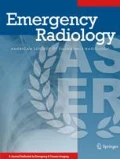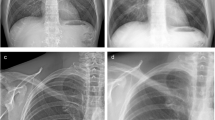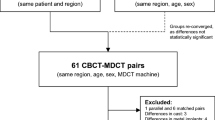Abstract
The purpose of this study was to evaluate the diagnostic equivalence, radiation dose, clinical usefulness and radiographic aspects of a low-dose, full-body digital X-ray machine in a busy trauma unit. A digital trauma X-ray machine known as "LODOX" was compared with conventional radiography between June 1999 and November 2001 in the Groote Schuur Hospital Trauma Unit, Cape Town. Digital images of a variety of body regions commonly imaged in trauma were compared for diagnostic image quality in a number of categories with equivalent conventional radiographs. A seven-point equivalence scoring system ranging from much inferior (−3) through equivalent (0) to much superior (+3) was used in each category. Radiation dose was recorded and compared with that in conventional measurements. Turnaround times of patients undergoing digital and conventional X-rays were evaluated. Clinical and radiographic issues were assessed by staff feedback. The digital images when compared with conventional film had an overall mean equivalence score of −0.429, with a standard deviation (SD) of 0.77. The best digital performance was in the mediastinum (mean 0.346, SD 0.49) and the weakest was for bony detail (mean −0.654, SD 0.81). Relative digital radiation dose compared to conventional varied from 72% (chest) to 2% (pelvis), with a simple average of 6%. Radiographic points included full-body imaging capability and differing positioning, penetration, workflow and practicality considerations. The digital images required overall patient times of 5–6 min, compared with 8–48 min for conventional X-rays. New installations are under way, and computed tomography and angiography applications are being explored. FDA approval is awaited. Projected cost is similar to that of flat-panel digital units. This digital unit was felt to be diagnostically substantially equivalent to conventional radiographs, with low-dose full-body imaging, improved workflow, digital technology and long-term cost benefits as potentially favourable contributions to trauma imaging.









Similar content being viewed by others
References
Beningfield SJ, Potgieter JH, Bautz P, Shackleton M, Hering E, de Jager G, Bowie G, Marshall M, Cox G, Pagliari G, Coetzee N (1999) Evaluation of a new type of direct digital radiography machine. S Afr Med J 89:1182–1188
Huda W, Scalzetti EM, Geiger R, Roskopf ML (2001) Clinical performance of a commercial prototype flat-panel digital detector for general radiography. Medical Imaging, The International Society for Optical Engineering, San Diego, 17–23 February 2001
van As AB, Beningfield SJ, Vaughan CL, Potgieter JH (2000) Trauma assessment in the third millennium; the LODOX imaging device. 4th European Congress, Trauma & Emergency Surgery, European Association of Trauma and Emergency Surgery, Pisa, 16–20 April 2000
Gray JE, Karsell PR, Becker GP, Gehring DG (1984) Total digital radiology: is it feasible? Or desirable? Am J Roentgenol 143:1345–1349
Curtis DJ, Ayella RJ, Whitley J, Moser RP, Rugh KS (1979) Digital radiology in trauma using small-dose exposure. Radiology 132:587–591
Tesic MM, Sones RA, Morgan DR (1984) Single-slit digital radiography: some practical considerations. Am J Roentgenol 142:697–702
Slasky BS, Sashin D, Horton JA, Sternglass EJ, Bron KM, Deutsch M, Herron JM, Kennedy WH, Boyer JW, Girdany BR, Skinner SR, Simpson RW, Hoy RJ, Feist JH (1987) Digital radiography of the chest by self-scanning linear diode arrays. Acta Radiol 28:461–466
Smathers RL, Brody WR (1985) Digital radiography: current and future trends. Br J Radiol 58:285–307
Kushner DC, Cleveland RH, Herman TE, Zaleske DJ, Ehrlich MG, Correia JA (1986) Radiation dose reduction in the evaluation of scoliosis: an application of digital radiography. Radiology 161:175–181
Kushner DC, Cleveland RH, Herman TE, McLoud TC, Waltman AC, Shepard JA, Dedrick CG, Kopans DB, Greene RE (1987) Low-dose flying spot digital radiography of the chest: sensitivity studies. Radiology 163:685–688
Sones RA, Lauro KL, Cattell CL (1990) A detector for scanned projection radiography. Radiology 175:553–559
Vandemark RM, Fay ME, Porter FR, Johnson GA (1997) Digital image-intensifier radiography at a level I trauma center. Am J Roentgenol 168:944–946
Elam EA, Rehm K, Hillman BJ, Maloney K, Fajardo LL, McNeill K (1992) Efficacy of digital radiography for the detection of pneumothorax: comparison with conventional chest radiography. Am J Roentgenol 158:509–514
Murphey MD, Quale JL, Martin NL, Bramble JM, Cook LT, Dwyer SJ (1992) Computed radiography in musculoskeletal imaging: state of the art. Am J Roentgenol 158:19–27
Saito H, Kurashina T, Ishibashi T, Shimanuki Y, Sakamoto K (1988) Digital radiography in an intensive care unit. Clin Radiol 39:127–130
Strotzer M, Gmeinwieser J, Volk M, Frund R, Seitz J, Manke C, Albrich H, Feuerbach S (1998) Clinical application of a flat-panel X-ray detector based on amorphous silicon technology: image quality and potential for radiation dose reduction in skeletal radiography. Am J Roentgenol 171:23–27
Murphey MD (1989) Digital skeletal radiography: spatial resolution requirements for detection of subperiosteal resorption. Am J Roentgenol 152:541–546
Bramble JM, Murphey MD (1990) Comparison of digital and conventional musculoskeletal radiography: observer performance study. Radiology 177:587–589
Wilson AJ (1995) Filmless musculoskeletal radiology: why is it taking so long? Am J Roentgenol 165:105–107
Buckwalter KA, Braunstein EM (1992) Digital skeletal radiography. Am J Roentgenol 158:1071–1080
Wilson AJ, Hodge JC (1995) Digitized radiographs in skeletal trauma; a performance comparison between a digital workstation and the original film images. Radiology 196:565–568
Seeley GW, Fisher HD, Stempski MO, Borgstrom M, Bjelland J, Capp MP (1987) Total digital radiology department: spatial resolution requirements. Am J Roentgenol 148:421–426
Templeton AW, Dwyer SJ, Cox GG, Lee KR, Johnson JA, Martin NL, Chang CH, Anderson WH, Hensley KS, Bialek J (1987) A digital radiology imaging system: description and clinical evaluation. Am J Roentgenol 149:847–851
Kogutt MS, Jones JP, Perkins DD (1988) Low-dose digital computed radiography in pediatric chest imaging. Am J Roentgenol 151:775–779
Aitken AG, Flodmark O, Newman DE, Kilcoyne RF, Shuman WP, Mack LA (1985) Leg length determination by CT digital radiography. Am J Roentgenol 144:613–615
Marshall NW, Faulkner K, Busch HP, Marsh DM, Pfenning H (1994) An investigation into the radiation dose associated with different imaging systems for chest radiology. Br J Radiol 67:353–359
Fajardo LL, Hillman BJ, Pond GD, Carmody RF, Johnson JE, Ferrell WR (1989) Detection of pneumothorax: comparison of digital and conventional chest imaging. Am J Roentgenol 152:475–480
Brody AS, Saks BJ, Field DR, Skinner SR, Capra RE (1986) Artifacts seen during CT pelvimetry: implications for digital systems with scanning beams. Radiology 160:269–271
Wade FA, Oliver CW, McBride K (2000) Digital imaging in trauma and orthopaedic surgery: is it worth it? J Bone Joint Surg [Br] 82-B: 791–794
Author information
Authors and Affiliations
Corresponding author
Additional information
Disclosure statement:This presentation was made possible by a full grant from LODOX (Pty) Ltd.
FDA 510(K) approval granted August 2002
Rights and permissions
About this article
Cite this article
Beningfield, S., Potgieter, H., Nicol, A. et al. Report on a new type of trauma full-body digital X-ray machine. Emergency Radiology 10, 23–29 (2003). https://doi.org/10.1007/s10140-003-0271-x
Received:
Accepted:
Published:
Issue Date:
DOI: https://doi.org/10.1007/s10140-003-0271-x




